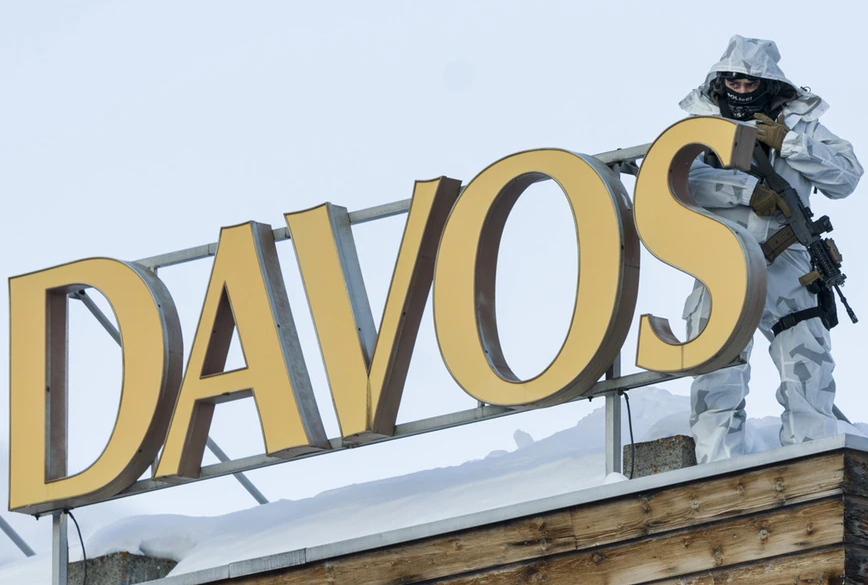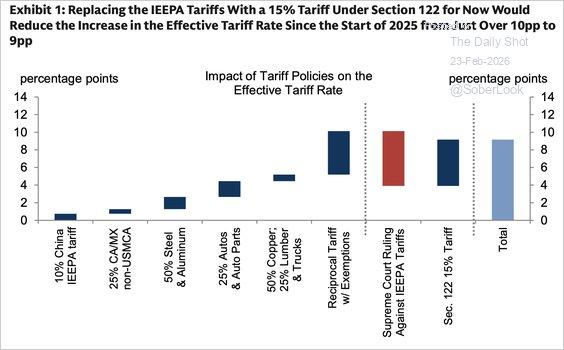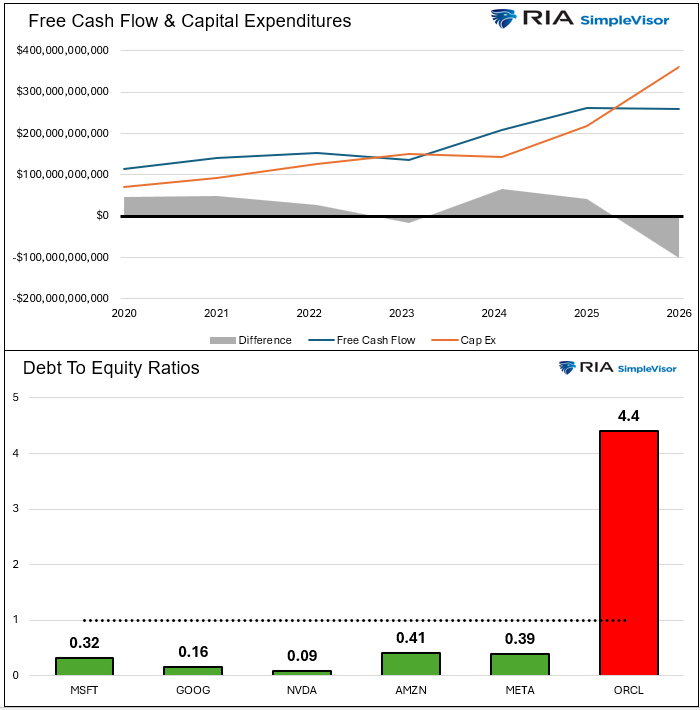
The term “Davos Man” was coined by political scientist Samuel Huntington who first used it in a 2004 essay in which he described people so enriched by globalisation that they were effectively living without loyalty to any particular nation. Keystone / Alessandro Della Valle
The global elite are gathering in the Alps this week for the World Economic Forum’s annual meeting. Journalist Peter Goodman, author of Davos Man, argues that these billionaires are a “separate species” who have become so powerful that they’re writing the rules for the rest of us.
The term “Davos Man” was coined by political scientist Samuel Huntington who first used it in a 2004 essay in which he described people so enriched by globalisation that they were effectively living without loyalty to any particular nation. He was referring directly to anyone who regularly made the journey to Davos to attend the annual World Economic Forum, more generally known as WEF.
The term has since grown into a catchall used by journalists like Goodman to refer to those occupying the “stratosphere of the globe-trotting class” of billionaires.
We spoke with Goodman about the bookExternal link, the Ukraine war and why, despite all its flaws, Davos is still worth the trip.
SWI: You’ve been to WEF ten times. What keeps you going back?
Peter Goodman: It’s actually a really interesting experience if you remind yourself that you’re a journalist and you don’t have to play by the socially imposed rules. You can observe people up close in a way in which you normally can’t with people so powerful and wealthy. The part that’s hard to take is the packaging that ‘they are committed to improving the state of the world’ as if a gathering of the ultimate beneficiaries of the status quo is somehow going to lead to this.
SWI: What has the WEF accomplished?
P.G.: I think the WEF’s primary achievement is that it’s given billionaires, who are continuing to pursue an agenda of tax cutting, deregulation and public relations management, a way to signal to the world that they get it, that they get the problems of economic inequality and climate change. And they’re really dedicated to doing something about it.
There are an awful lot of highly intelligent, thoughtful, accomplished people who work for the WEF. They put out reports that are significant. A lot of the panel discussions themselves tee up issues of importance. But let’s not kid ourselves. It’s ultimately under the guise of a non-profit, a highly successful business run by Klaus and Hilda Schwab. We don’t know where the money goes.
SWI: In your book, you blame billionaires for a lot of our problems. Is it really just a few bad apples or is it a more systemic problem?
P.G.: It’s a systemic problem. I could have written this book by picking 20 other characters. I picked the five who I thought were the most compelling. These are big players. It’s not like I’ve just cherry picked some bad offenders. Steve Schwarzman is the world’s largest private equity magnate and owns astonishing amounts of real estate around the world. Larry Fink is the world’s largest asset manager. His company, BlackRock, manages $10 trillion worth of investments. The impact is enormous. Jeff Bezos requires no introduction.
Marc Benioff is a very significant Silicon Valley tech player and is the most vocal on stakeholder capitalism. I think he is dedicated to philanthropy and a believer in the ethos of the Forum. And yet, despite presenting himself as an agent of human progress, he’s ultimately an enabler of the status quo, which is exactly what the Forum is. It’s an enabler of the status quo under the guise of a change agent.
SWI: All of these examples come from the United States. Do you think this, specifically the growing power of the billionaire class, is an American phenomenon?
P.G.: It’s not uniquely American. It might be to the extreme. But look at France, where, Emmanuel Macron, who is a Davos man, comes into office financed by some billionaires, including Bernard Arnault, with the mission to lower or eliminate wealth taxes. He runs as this transformational agent who’s going to spread opportunity in France and shake this ossified, anti-business, overly bureaucratic society with high unemployment and modernise it. And the first thing he does is lower wealth taxes and then he increases gasoline taxes, much to the consternation of most people living outside of major cities who need their cars to get where they’re going. And the result is the Yellow Vests movement and a surge of support for Marine Le Pen’s extreme immigrant demonising movement.
This may have started in the US going back to Milton Friedman and his theory of shareholder maximisation as the organising principle of commercial life. But it was then exported around the world.
The global elite, whose wealth is hard for the rest of us to fathom, have created a set of interests that are just separate from the rest of ours. And that’s ultimately why I came up with this concept of the Davos Man, as a separate species, because for all intents and purposes, these billionaires, who are powerful enough to write the rules are effectively inhabiting a separate reality than the rest of us.
SWI: Do you see Switzerland’s role in the emergence of Davos Man as significant in any way?
P.G.: The secrecy element, as an inherent part of doing business, is certainly significant. The fact that Switzerland has for now generations been a place where wealthy people can show up, no questions asked, and conduct their business and find a highly competent bureaucracy that protects their secrets to move money around – I don’t think that’s an accident.
It’s no coincidence that this non-profit that is actually a highly successful business is propped up in a country that presents secrecy as a comparative advantage.
(Watch the video interview below with Alois Zwinggi, managing director of the World Economic Forum, who rejects claims that the organisation and its annual gathering in Davos is a disconnected billionaires’ club.)
SWI: You write in your book that the pandemic revealed the “full dimensions of Davos Man’s voracious appetite”. How so?
P.G.: The vaccine situation is even worse than I imagined when writing the book. We are effectively subsidising Davos Man’s monopoly profits on these handful of vaccines, that we are grateful for, through the perpetuation of the pandemic. Why are we still talking about all these variants? Well, most of humanity doesn’t have these vaccines. Why is that?
Because leaders said, the market will just take care of it and this well-intentioned pharmaceutical industry will protect humanity. And it’s failed completely. We’ve distributed the vaccines so that the shareholders of Moderna and Pfizer get as much as possible. And the result is that, if we’re lucky enough to live in countries like the US or Switzerland, we got vaccines aplenty. However, in Pakistan, where there’s still doctors treating frontline medical workers, not so much.
SWI: You published the book in January, about a month before the Ukraine war. If you wrote another chapter now, what would you write?
P.G.: If I were still working on the book, I’d write about these sanctions, which are kind of incredible in the way Europe has united behind them. But let’s remember that the sanctions are effectively exempted for private equity. I’ve just pointed the finger at Switzerland but the US is the ultimate offshore banking centre because Davos Men benefit by having private equity not governed by the same demands for transparency that the normal banking system has. The point of my book is to say this is not by accident. This is the direct consequence of the financial services lobby and specifically private equity understanding that the more secrecy there is, the more money flows in.
Let’s assume that putting pressure on Russian oligarchs will actually influence Putin, we aren’t even applying the full pressure on oligarchs because we’re protecting our own oligarchs
SWI: What do you think WEF should do differently?
P.G.: All the right words are spoken at Davos. That’s not the point. Ultimately, it’s not about the wealth in Davos. It’s about the rest of us. The people in democratic societies have to get over this idea that we can look to these good billionaires to solve our problems. Our problems are not going to be solved until we demand things like progressive taxation, antitrust enforcement, and labour mobilisation so that workers can get a piece of the action. It’s not about reforming the billionaires.
Full story here Are you the author? Previous post See more for Next postTags: Featured,Multinationals,newsletter


































